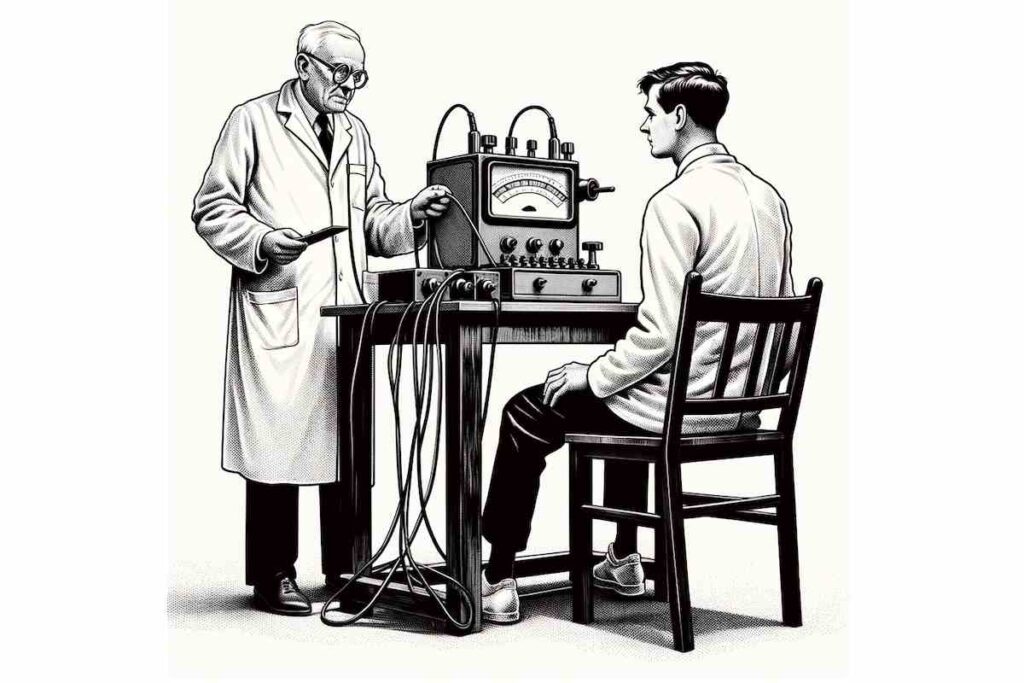ESL/EFL Level: Upper-Intermediate (B2/C1)
Lesson Topics: Obedience, Authority, Ethics
Skill Focus: Reading, Speaking, Vocabulary
Approximate Class Time: 2 hours
Lesson Plan Download: milgram-experiment-upper-intermediate-032024.docx
Lesson Overview:
Lesson Topics: Obedience, Authority, Ethics
Skill Focus: Reading, Speaking, Vocabulary
Approximate Class Time: 2 hours
Lesson Plan Download: milgram-experiment-upper-intermediate-032024.docx
Lesson Overview:
- After warm-up questions, students read a 200-word passage. The passage is a simplified (B2/C1) version of the commentary from a short video (2:17 m) on Stanley Milgram's famous experiment on obedience. After reading the passage, watch the short video so your students can get a better sense of how the experiment was conducted. The video outlines a fascinating study from the 1960s that shows that regular people, when under pressure, will obey authority instead of their own conscience.
- After comprehension questions, students match vocabulary from the video to definitions and then form discussion questions using the target vocabulary.
- There is one debate topic about the value of such psychological studies that would be deemed unethical today due to the stress they put on participants.
- The two role-plays in this scenario are on heavy topics. The first, based on true events, relates to a hoax phone call ordering restaurant managers to strip search their employees. The second is a discussion between two parents about giving their child immunizations/vaccinations. Teachers, please pre-read this section and ensure it is appropriate for your class.
- Next is a list of five scenarios (some light-hearted) designed to measure a person's level of obedience in different situations.
- This is followed by some famous quotations about obedience and authority. The lesson ends with a review of vocabulary and collocations before presenting some final discussion questions.

UPPER-INTERMEDIATE (B2/C1) Lesson Plan on Milgram’s Experiment
Warm-up-Questions
- Do you listen to your parents when you were a child?
- Describe a time when you did not listen to an authority figure (someone who has more power or status than you) like a boss or a teacher. Why did you not listen?
- Do you think generally that people are good or bad?
- In general, do you think you are a moral person? Why do you think so?
Membership is required to view this post. Please support EnglishCurrent by becoming a member today. Members, please log in.
This lesson plan was created by Matthew Barton of EnglishCurrent.com (copyright). Site members may photocopy and edit the file for their classes. Permission is not given to rebrand the lesson, redistribute it on another platform, or sell it as part of commercial course curriculum. ChatGPT was used to generate answer keys and some famous quotations. For questions, contact the author.
Vocabulary Answer key: 1-c, 2-b, 3-k, 4-a, 5-d, 6-j, 7-I, 8-h, 9-f, 10-e, 11-g
Comprehension Question Answer Key
- The study shows that a significant number of people are willing to obey authority figures, even when asked to perform acts that conflict with their personal conscience and ethical standards.
- Participants were told that the study was designed as research to improve memory. The study was actually about measuring obedience to authority.
- Milgram was interested in understanding how individuals could be compelled to obey authority figures to the point of committing atrocities, as was seen in the Holocaust.
- Authority, Obedience, Conscience (Other possible answers include Ethics, Compliance, Autonomy, etc.)
- …
- Modern ethical standards for psychological research require informed consent, full disclosure, and the prevention of psychological harm. Milgram's study would be considered unethical today as it could cause significant psychological distress and deception.
- …
Collocations 1-e, 2-a, 3-b, 4-d, 5-c
[1] https://en.wikipedia.org/wiki/Strip_search_phone_call_scam
